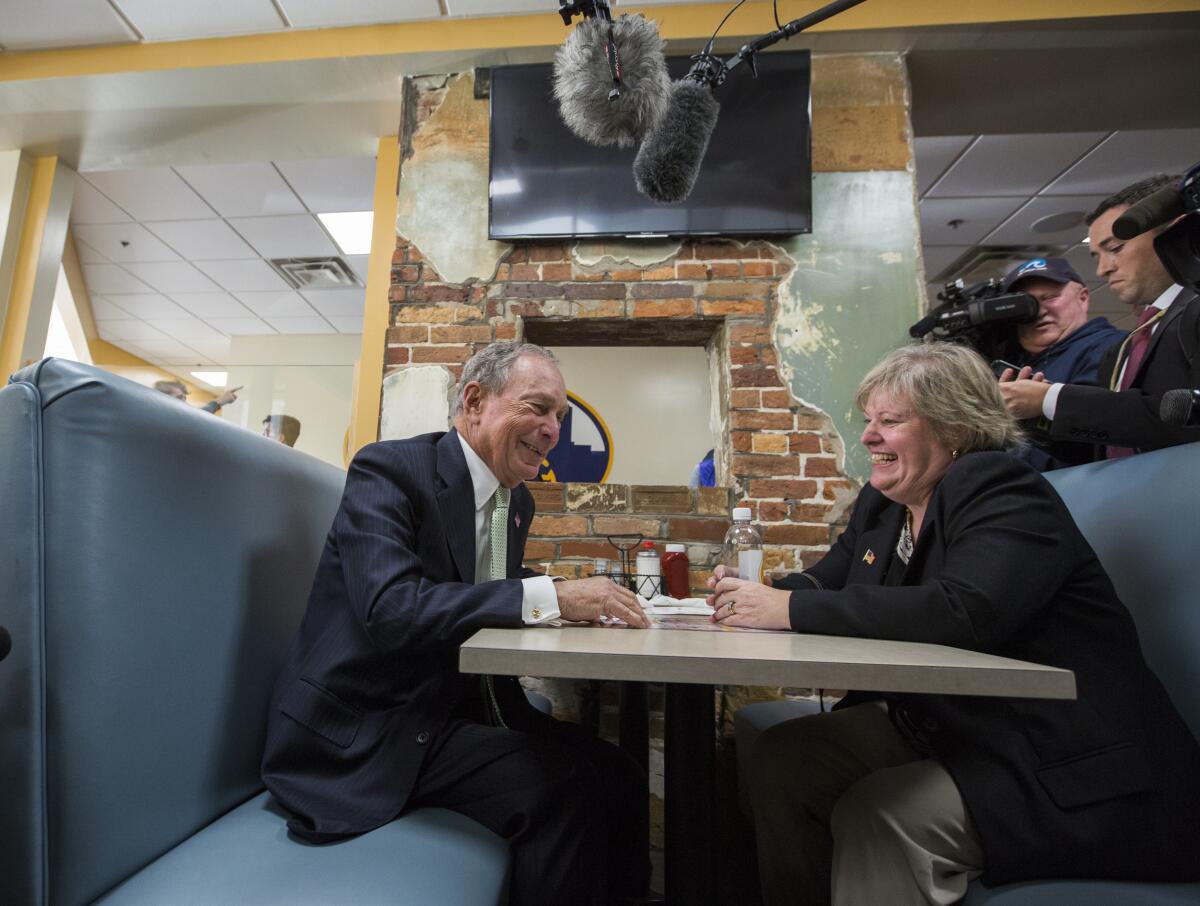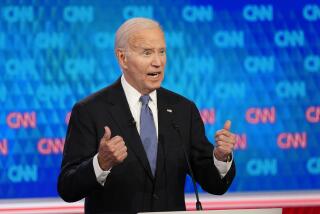Michael Bloomberg brings his billions — and his baggage — to presidential race

- Share via
WASHINGTON — Michael R. Bloomberg held his first presidential campaign event Monday, and if it sets the pattern for the rest, don’t expect to see the newly minted candidate in public very much.
Bloomberg visited a diner in Norfolk, Va., ordered a cup of decaf coffee with milk while cameras whirred, then held a five-minute question and answer session with reporters before heading back behind closed doors.
The former New York mayor never put much stock in retail politics — his huge fortune allowed him to campaign heavily on television ads, and he made clear that he expects to do that again.
His plan to forgo raising money from any donors — including the hundreds of thousands of small donors fueling rival campaigns — will cost him considerable exposure. Candidates who don’t raise money from individual donors don’t qualify for the televised candidate debates.
But the 77-year-old media billionaire said being excluded from the debates didn’t bother him.
His plan to reach voters through tens of millions of dollars in ads will effectively “explain what I’ve done and what I would do and give them some comfort that because of what I have done in the past, I would deliver in the future,” he said. “They are not just empty promises. If you can say that in a debate, OK. It is hard to do that. I think I would be much better off talking to the public.”
As for the charge from rival candidates that he is trying to buy the nomination — an accusation repeated on the campaign trail Monday — Bloomberg brushed it aside, saying, “I am going to make my case and let the voters, who are plenty smart, make their choice.”
Taking no donations means he can’t be bought, he said, adding that he will take a salary of $1-per-year if elected.
Bloomberg said he chose Norfolk for his campaign kickoff because it was in Virginia, where his money helped Democrats take control of both houses of the state Legislature in this month’s election.
“Southeast Virginia proves that with the right candidate, we can turn areas from red to blue,” Bloomberg said. “We need to do that all across this country.”
While that may be true, the path he’s chosen involves a big gamble. Bloomberg’s initial $37-million ad buy eclipses the entire advertising budget of other candidates who have been in the race for many months. Yet America has a long history of wealthy candidates whose outsized spending produced a paltry return in voter support.
There is one in the Democratic presidential field already: California billionaire Tom Steyer is floundering in the polls despite a hefty investment in his own presidential bid. And Steyer is actually on the debate stage.
Bloomberg said that a presidential bid is his calling, even at a time when a glut of candidates has left many Democratic voters wishing for fewer choices, not more.
He avoided explicitly declaring his rivals aren’t up to the job, but echoed the anxieties about the field that have swirled among some party establishment figures.
“There is a greater risk of having Donald Trump reelected than there was before,” Bloomberg said. “I looked in the mirror and said, ‘I just cannot let this happen.’”
As expected, Bloomberg positioned himself as a centrist, promising, for example, affordable healthcare for everyone, but not an end to private insurance. His remarks sounded similar to those of former Vice President Joe Biden, who continues to lead the race in most national polls, but whose stumbles have potentially left an opening for a candidate like Bloomberg.
Bloomberg’s billions both open his path to the nomination and complicate it. His rivals are gaining traction by holding out wealthy individuals like him as a symbol of the country’s deepening economic inequality. Some, notably Sens. Elizabeth Warren and Bernie Sanders, are calling for steep wealth taxes that would cost Bloomberg a not-insignificant chunk of his fortune.
The former mayor said in his launch video Sunday and again in Norfolk that he too believes people like him should be taxed more. He did not specify how much.
He also moved to mitigate the political harm caused by the “stop and frisk” police tactics he backed as mayor. Those policies are deeply unpopular with many African American voters, who are crucial to winning the Democratic nomination.
Bloomberg said he “worked very hard to make sure we would tackle discrimination wherever I saw it. New York City has a record that is not perfect, but I think we should be proud of in terms of making it a city open to everyone.”
“I worked hard in minority communities, brought the crime rate down and saved an awful lot of lives,” he said.
There was other major baggage confronting Bloomberg as he launched his run: the Bloomberg media empire owned by the billionaire, which reports extensively on presidential politics. Editor in chief John Micklethwait told journalists there on Sunday that they would not be doing any investigations into Bloomberg or his Democratic rivals, a decision that was not received well in journalism circles.
“It is truly staggering that any editor would put their name on a memo that bars an army of unbelievably talented reporters and editors from covering massive, crucial aspects of one of the defining elections of our time,” tweeted Megan Murphy, the former Washington bureau chief at the company. “Staggering.”
On Monday, Bloomberg also stepped down from his post as the United Nations’ special envoy for climate action. He’s done work with the U.N. on climate change since 2014.
At his news conference, the candidate talked about all the things he has done in government and political advocacy in making the case that “more than plans, I offer the leadership to turn plans into reality.”
But he also worked to project some humility. Asked whether any big Democratic power brokers — such as former President Obama — had called to offer guidance, Bloomberg declined to name names but did say he received “some very flattering calls.”
“I didn’t grow up in a world where I knew famous people,” he said. “When you get a call from one of them, I still pinch myself a little.”
More to Read
Get the L.A. Times Politics newsletter
Deeply reported insights into legislation, politics and policy from Sacramento, Washington and beyond. In your inbox three times per week.
You may occasionally receive promotional content from the Los Angeles Times.











